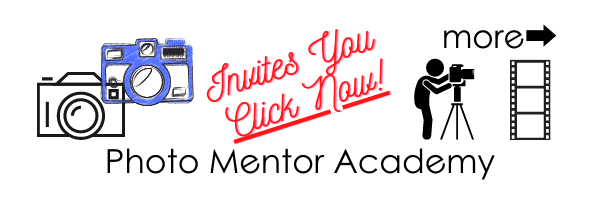The Undeveloped Photographer: Before the Flash
Jun 08, 2021
Finding success in photography means different things to different people. One thing I’ve learned is to develop the undeveloped photographer; you need to zero in on what’s blocking your development.
Welcome to the Photo Mentor Academy’s Blog, where the first thing we’ll work on is uncovering your artistic vision, overcoming stopping points, and ultimately helping you find your unique success with photography.
Whether for fun or to go pro, you can start here.
Your success is one-of-a-kind and like no other. YOU, and not your camera or equipment, is what you’re going to learn makes all the difference for the photo art you create and produce.
Don’t get me wrong; there are many things to learn as far as technique, style, composition, cameras and equipment, processing and tech, lighting, and more. But let’s start with the right mindset and those nasty little hangups.
Even though these things are what I’ve picked up as most significant in helping undeveloped photographers, everybody struggles with this from time to time. Yes, even me.
These are the 3 areas I’ve discovered from working with hundreds of learning photographers worth paying attention to:
- Confidence
- Overwhelm
- Direction
Maybe those 3 words alone are enough to get you thinking, but let’s dissect.
Confidence Waning?
Lack of confidence shows up in a few ways I often notice. Maybe because the undeveloped photographer is sometimes new and uncertain, these are common mistakes.
First, taking way too many pictures in the hopes of capturing one good one is a common mistake. This is fear-based photography and ends up costing a lot of time and editing work for starters. Further, because you have so many pics, you also give the client too many.
Clients only need to see your best work. Indecision ensues with too many choices and hurts the sale. As a counter to this, preparation is critical. You need to have a plan, a concept, and an idea of precisely what you are trying to capture before you take one shot. This thoughtful approach helps you get the right pictures without haphazardly shooting potshots!
Another sign your confidence is faltering shows up in your inability to say yes to job offers. In some cases, your very best work flows from challenging yourself and taking on something new. It’s a matter of trusting your instincts and knowing you are capable of any assignment if you give it your best. Part of being a good photographer is being a problem-solver.
Fear and Loathing
We all fear failure, rejection, and embarrassment, but those things are your ego talking, and when you think that way, you put the focus on yourself. Instead, focus on the person or subject of your photography and not on you. Thinking outward and of others allows you to focus on getting results instead of perceived inadequacies.
To ease yourself out of the struggle against fear, ask yourself the following questions:
- Why do you love photography?
- What would you shoot, even for free, cause you love it so much?
- What is it you are getting out of the experience?
These answers go beyond passion or money, but deep down, you know the answer.
Remember, your worth and the value of the art you produce are not based on what other people think but rather on how you feel and grow in the process. Everyone has different tastes, and some people will love your work, and others will hate it. What they think isn’t up to you or a reflection of you. I know, sometimes that one’s hard to remember.
Still, when you feel the joy in your photography and gain value in the process and experience, you will surely grow. The Photo Mentor Academy is here to grow and take the journey with you, with valuable insight and help at every step. The thing is, I think you’ll find fear dissipates with action and forward motion.
Like many things, the more you practice and the more proficient you become, the more confident you will feel.
When Overwhelm Takes Over
Overwhelm causes inertia. Not only are you running around in a confused state, but you also begin to lose confidence all over again. One thing that causes overwhelm is what I call SOS or Shiny Object Syndrome. Maybe you know what this means, but the most important thing I can share with you is this:
“The secret you have yet to realize is you already own the best gear that no amount of money can buy, YOU.”
~Lee Love
Another kind of overwhelm exists when you are judgemental of your work. I know I’m my own worst critic. Being critical of your work can be a good thing if you use a critical eye to learn and grow. On the other hand, being so critical, it makes you frozen isn’t helpful at all.
One thing you do NOT want to do is compare your work with others. Each of us has our unique path to find our art and hone our artistry. Each step is essential; each a learning opportunity or individual chance for growth.
One way to decompress overwhelm is to deconstruct a project so you can clarify each action, each step, each process you need to take to accomplish your bigger goal or complete a project. When you condense a bigger task into steps or doable pieces, it becomes less daunting and lets you make continuous progress.
Do yourself a favor and take a deep breath, break it down, and go!

Overwhelm Can Be Overwhelming
It’s okay to have a wish list for new cameras or equipment or whatever but learn to lean into what you have to work with now. Create to do the best you can or tell a story or help or show someone else’s vision in a photo. Again, think about the work, the photograph you want to take, the tale you want to convey in a single shot, and the overwhelm will dissolve away.
Overwhelm also rears its ugly head when you get too focused on technology. Again, I say it; it’s not the equipment; it’s the photographer. Sure technology is nice. I like it too. But don’t make that the focus or let it send you off track. I find this one to be a big problem for people.
Too many new and undeveloped photographers think if they get better gear, their images will be better, and there’s nothing further from the truth. Are you getting my main point yet, loud and clear, when I say the most important thing about good photography is your point of view?
It’s about the photographer behind the lens. YOU are the artist and the most significant factor in becoming a successful photographer.
The Photo Mentor Academy helps you hone in on, find, and nurture your unique gifts and skills. Your development is what matters, and my experience gives you the guidance you need to get where you want to go with your photography. Get updates here.
Deliberating Your Direction
Direction is the final major area where I see new and even more experienced photographers struggle. We all have a lot of interests. That’s great.
But when it comes to business and particularly for photography businesses, being known for something is a major plus. Once you establish a great reputation as the go-to photographer for weddings, for example, or family portraits, or whatever it is, the easier it then becomes to expand into other areas later.
My example of why generalists aren’t the answer for your photo business is to compare Walmart to Tiffany’s. One covers pretty much everything and one is exclusive. You pick what you’d rather aspire to. Don’t worry though, we all start at zero. We’re all a diamond in the rough.
One way to hone in on your perfect direction is to analyze the following:
- What do you want to shoot?
- What are you excited about or think of as your thing?
- Who do you want to work for? (examples: families, chefs, businesses)
- What do you have experience with?
Then start to practice and share the kind of work you want to do. Experiment. Add your best pieces to a portfolio to showcase your work.
Sure, lighting is the key to photography; composition matters; but connecting by telling a story in a single shot and creating an emotional response, wins.
by: Lee Love, Your Photo Mentor



